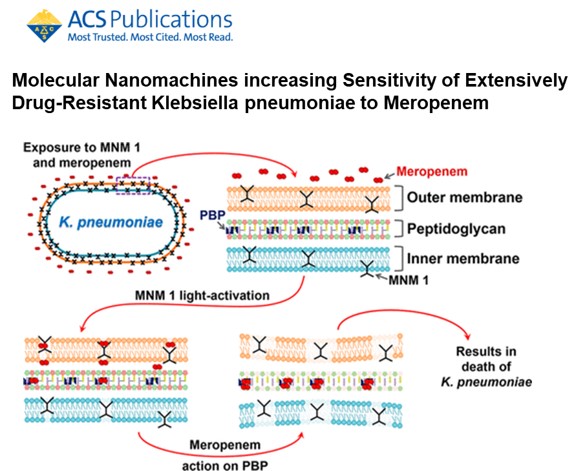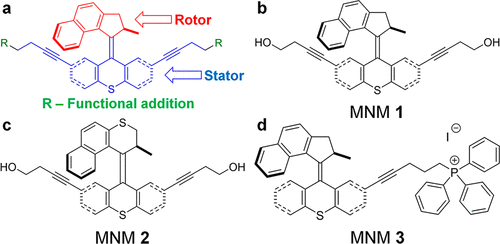Can molecular nanomachines solve the problem of multi-drug-resistant pathogens?

Recently, Dr. Jeffrey Cirillo's team published the paper "Molecular Nanomachines Disrupt Bacterial Cell Wall, Increasing Sensitivity of Extensively Drug-Resistant Klebsiella pneumoniae to Meropenem." in ACS. This study suggested that Molecular Nanomachines (MNMs) could be used to make conventional antibiotics more efficacious against multi-drug-resistant pathogens.
Dr. Jeffrey Cirillo was elected a Fellow of the American Academy of Microbiology for his achievements and contributions to field of microbiology! Congratulations!
Multidrug resistance in pathogenic bacteria is an increasing problem in patient care and public health. Molecular nanomachines (MNMs) are synthetic organic nanomolecules that have a rotor component with light-induced actuation (motorization) that rotates unidirectionally relative to a stator (Figture1). Molecular nanomachines (MNMs) have the ability to open cell membranes using nanomechanical action.
Dr. Jeffrey Cirillo's team hypothesized that MNMs could be used as antibacterial agents by drilling into bacterial cell walls and increasing susceptibility of drug-resistant bacteria to recently ineffective antibiotics. They exposed extensively drug-resistant Klebsiella pneumoniae to light-activated MNMs and found that MNMs increase the susceptibility to Meropenem. MNMs with Meropenem can effectively kill K. pneumoniae that are considered Meropenem-resistant. They examined the mechanisms of MNM action using permeability assays and transmission electron microscopy, finding that MNMs disrupt the cell wall of extensively drug-resistant K. pneumoniae, exposing the bacteria to Meropenem. These observations suggest that MNMs could be used to make conventional antibiotics more efficacious against multi-drug-resistant pathogens.

Figure 1. Molecular nanomachine structures. (Thushara et al, 2019)
Bite-sized education video on this publication
Latest Newsletters in 2020
- A monatomic gold reactor constructed in a conical biological nanopore
- Are we entering an era of ternary vector system for genome editing in plants?
- Electrode-free nanopore sensing by DiffusiOptoPhysiology
Become a Cloud Scientist on MolecularCloud
Shine a light on your research and connect with the world